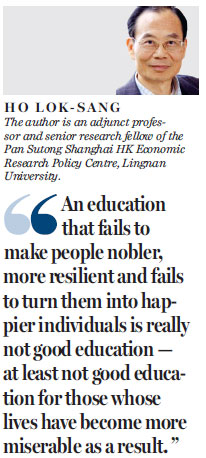Education system not helping students to face life's problems
Updated: 2016-03-08 08:05
By Ho Lok-Sang(HK Edition)
|
|||||||||
Another university student ended her precious life. This is the 15th suicide this academic year in Hong Kong. This time the student was already in her third year at medical school. We can assume she already had 15 years of education behind her - not counting the kindergarten years. But these years had not equipped her with the stamina to face life's difficulties. Our education system must really be in a sorry state.
But we are not alone. In the United States, the Massachusetts Institute of Technology (MIT) and Harvard, both universally recognized as among the world's foremost universities, have consistently had high student suicide rates. Over the last decade, MIT has had a suicide rate of 10.2 per 100,000 students, and over the past five years the rate has gone up to 12.5 suicides per 100,000 students. At Harvard, the rate of suicide among undergraduates averaged 11.8 per 100,000 undergraduates over the past decade. These rates are much higher than the national average of between 6.5 and 7.5 suicides per 100,000 students.
It appears that high achievers who can get into places like Harvard, MIT, and medical schools, are often more vulnerable. Top universities are highly competitive places, and a highly competitive environment can lead to suicides if people are not able to cope. Anyone who can get into Harvard or MIT or a medical school in Hong Kong must have a record of very strong scholastic achievements. But this does not mean they will automatically have the mental qualities to deal with competing demands and frustrations. Unfortunately, our school curriculum seldom offers training or even advice on these things. More often than not, our schools and our parents tend to put great pressure on their students to outperform others and this does not help.
As desirable as a degree from Harvard, MIT or a medical school is, students need to learn that completing the degree is neither a necessary nor a sufficient condition to living a worthwhile life. A satisfying life is a life following your heart, and a life with a strong sense of direction. But this strong sense of direction does not have to take a particular form. If somehow you had tried the best you could and you still failed an examination this is not the end of the world. You can still seek your dreams without the degree. I have read success stories about graduates from top universities running a restaurant or doing something that apparently had nothing to do with the undergraduate program in which they were enrolled.
A report says that as many as 42 percent of graduates from Harvard had sought mental health counseling during their studies at the university. The report says this was a startling finding. But this is hardly surprising. At Harvard, expectations are high; competition is keen; the curriculum is demanding; and time is limited. But an education that fails to make people nobler, more resilient and fails to turn them into happier individuals is really not good education - at least not good education for those whose lives have become more miserable as a result. Parents should therefore take note: Trying to place your children in top universities may not do them much good at all.
Let us admit it. Independent thinking is a rarity. I am not just saying that young people generally lack this quality. I am saying that as social animals, most of us are not really the "independent thinkers" we thought we were. We are all vulnerable. Courses like "critical thinking" are common in universities and liberal studies are now a requirement in our secondary schools. But this does not make people independent thinkers. We are all so easily molded by our environment. A medical student cannot easily free himself from the thought that he must pass.
The surprise is that this realization is really the first step to independence of thought. In the absence of this realization, we would be either arrogant or weak. We would be arrogant when we thought we were always right and refused to examine other people's views objectively. We would be weak when we tried to mold ourselves into the boxes that the environment aggressively tries to fit us into. The suicidal ones are those who struggle to fit themselves into the boxes others have prepared for them.
I have been pleading for the introduction of "life education" into our school curriculum for years. Some schools have experimented with life education with very good results. The essence of life education is to nurture among our students a reverence for life and an understanding that life is really the end - all other things are just a means. All human endeavor is to enhance the quality of life and the quality of human existence. This is what makes our lives meaningful. With such understanding, our students will become respectful and considerate. Dialogues will become possible. Difficulties will then be overcome.
The suicide of yet another top student in Hong Kong is very sad news. But if it awakens among parents, teachers, and policy makers the importance of life education, then perhaps we can look forward to a better future.

(HK Edition 03/08/2016 page10)